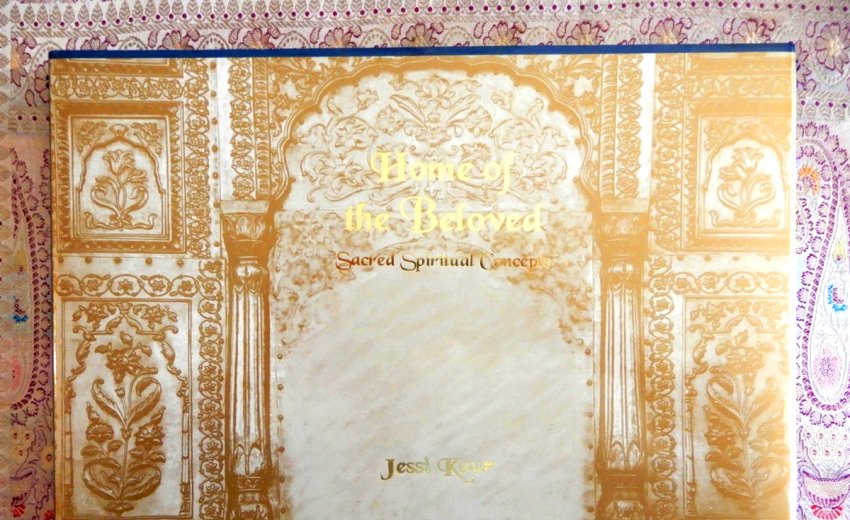If we are interested in learning about the Sikh faith or interested in shared and converging interfaith matters, the recently published book, “Home of the Beloved ~ Sacred Spiritual Concepts” by Jessi Kaur would intrigue your spiritual curiosity and excitement. The layout and content will draw you in with a beautiful presentation of the defining Sikh faith precepts and significant concepts, philosophical foundation and revelations about the mystery and meaning and of life as enshrined in Siri Guru Granth Sahib (SGGS), the Sikh Holy Scriptures. The highlighted concepts in this book inspire us to learn more and in greater depth about Sikh spirituality and practice, and trigger a fascination about spiritual journeys and heritage of other major faiths.
For readers not familiar, a word about Sikh faith and Sri Guru Granth Sahib: Sikhism is a monotheistic faith that originated in India over 550 years ago, guided by Ten Gurus (Enlightened Prophets and Teachers) between (1469-1708), and has today an estimated 35 million followers worldwide and nearly one million Sikhs in the USA. The Sikhs revere Sri Guru Granth Sahib in Gurumukhi-Punjabi language as their Living Eternal Guru. The monumental ecumenical Scripture enshrines 5,894 compositions attributed to six Sikh Gurus and 30 Sikh, Hindu, and Muslim Saints from diverse spiritual traditions. A majority of the Divinely-inspired compositions in exalted poetry are keyed to 31 designated Ragas (musical measures that evoke different moods). The young Sikh faith is a bridge between the ancient Eastern Asian and Abrahamic religions according to Bhai Gurdasjee, the original scribe of SGGS and a respected Sikh scholar. The ancient and contemporary sacred concepts and traditions, arts and architecture, and other elements reflect that venerable connection.
The Sacred Spiritual Concepts prepare our mind, spirit, and spiritual energy for a pilgrimage into our deeper selves: Devotion to Naam Simran (recitation, meditation, and reflection); Righteous Labor, “truthful living,” and sharing our blessings with the needy. The sacred concepts emphasize the immense significance of seva (selfless service): “to get a glimpse of the Wonderful God” described as: "All-Knowing, Self-Created, Self-Illuminated, and “From before the Beginning of Time and Life;” Creator and All-Embracing Benevolent Father and Mother of all sentient beings. “All humanity is One Race” and as One God’s Children are blessed with the “same Divine Light” without distinction. This enlightened and unifying revelation and spiritual truth dispels and rejects all negative and unworthy divisions based on caste, creed, ethnicity, nationality, or other factors.
Sacred Spiritual Concepts introduce us, lead us forward, and command us to walk the path of discipline, sacrifice, and compassion, and recognition: One Supreme Unfathomable God is the Creator of all that is manifested before us. God resides in splendid Majesty in the indescribable celestial realms, reverberating with Naad (sacred music), and studded with His dazzling stars and galaxies that are beyond human sight and understanding; and at the same time, God resides in the heart and spirit of all beings. This revelation about God within and in every fiber of Creation tugs at our heart. We are taught to seek this relationship with God. The Guru as the God-Messenger introduces us to the emancipating concepts as our bridge to connect our lives to a higher consciousness, fulfill the cherished goal of merging back with the Divine Spirit, and returning to Home of the Beloved (Sanctuary of God). The Sikh Scriptures reveal this Reunion and Oneness with God and freedom from the transmigration cycles of the soul are the ultimate aim of human life. Other faiths echo similar urge about salvation, deliverance, and return to be united with God.
With each scholarly effort, such as Home of the Beloved, the once unfamiliar faith takes another leap forward towards greater understanding about the unifying spirit of the Sikh faith. Jessi Kaur endeavors to highlight the unique and common ground and a rightful place among major faiths traditions that grace the world-landscape of spirituality. The author thoughtfully presents in Sacred Spiritual Concepts the principles that make the core of Sikh doctrine, tradition, and legacy: Oneness of God; sanctity of all life, faiths, and cultures; equality, dignity, justice, and sacred rights of all sentient beings; serving, harmony, and peaceful coexistence; and honoring and preserving this Planet as “God’s Dharamsaal: Cathedral of Spirit” for the benefit of all who share this Earth.
Home of the Beloved thoughtfully reacquaints us “with the broad message of Sri Guru Granth Sahib, offers concise explanations of universal spiritual concepts” - Jessi Kaur. I see this work as a beautiful night-table Prayer-Book: for those in search of the sacred and holy in Sikh tradition and finding echoes of their own faiths. It is a reference guide for the moment and concern at hand: someone looking for spiritual light and true meaning in a valued concept; illuminating message for a special occasion; to close the day on a higher note of spiritual dimension and direction. The sacred concepts would be an insightful resource for comparative religious studies and advancing interfaith inquiry, scholarship, and dialogue.
Each turn of the page leads our eyes to see first on the right-hand page an ornamentally decorated Sacred Concept (Gurumukhi word(s) in Roman script) and their explanation and interpretation in English follows. When our eyes turn to the left-hand page, we are introduced to two or three quotes from Sri Guru Granth Sahib where that Concept and the context in which it appears in the Sikh Holy Scriptures is identified. Below the Punjabi script, there is a translation of the selected lines in English. These sacred quotes in a beautiful font rise from a golden backdrop, signifying a spirit of sanctity of the Sacred Word. The Concepts cover many subjects and matters of spirit.
This is simply a beautiful and brilliant design decision carried throughout the Home of the Beloved. Page after page one encounters another Sacred Concept and our mind and spirit are moved along a sacred river of spirituality. I see this flow as a spirit-thread, with each Sacred Concept as a valued pearl, and together making the Home of the Beloved as an illuminating poetic Raagmala of Spirituality and sharing an Aarti (a prayer of veneration with music and lamps) for the spirit yearning to merge with the Beloved.
Home of the Beloved is a spiritually uplifting and illuminating endeavor where we encounter spiritual concepts that are unifying, affirming, and emancipating. They often seamlessly interface with the sacred common visions of other faiths and brighten our spiritual journeys.
I find a lot of delight in opening a page at random and getting my message and area to work on that day. A spiritually uplifting and delightful reading gives us pause, calls us in, and then sends us on our way to work on our Khima (forgiveness); Daya (compassion); Sidak (steadfast faith); Simran (remembering the Divine); Seva (service without the trumpet of ego); and Ardas (prayer). The book is a messenger and a thoughtful teacher!
My Prayerful Reflections are not intended as a critique; they are about finding light, inspiration, and connections. I make no judgement about the choice of Scriptural quotes or their translations, or the intent and content featured in Home of the Beloved. I leave that to the Sikh scholars and the astute readers. I find this endeavor with no major disagreeable areas from the point of my limited knowledge about the matters of spirit and their intersections with cultural, interfaith, and humanitarian crossroads. I saw much wisdom laid out as a poetry-of-the-spirit symposium to converse with, reflect upon, and learn from and take my own leaps of faith.
The book, Home of the Beloved ~ Sacred Spiritual Concepts, is authored by Jessi Kaur - a scholar, teacher, and author of children’s books; Edited by Mirin Kaur Phool, Founder of The Kaur Foundation; Calligraphy by Jyoti Singh; Funding provided by IGS NOW; Institutional Support: Chardikalla Foundation; and other scholars and benefactors. Publisher: Gage Associates (2019); ISBN 978-1-7341946-0-9; ISBN EBook 978-1-7341946-1-6
KPSinghDesigns Indianapolis, Indiana USA February 5, 2021a





